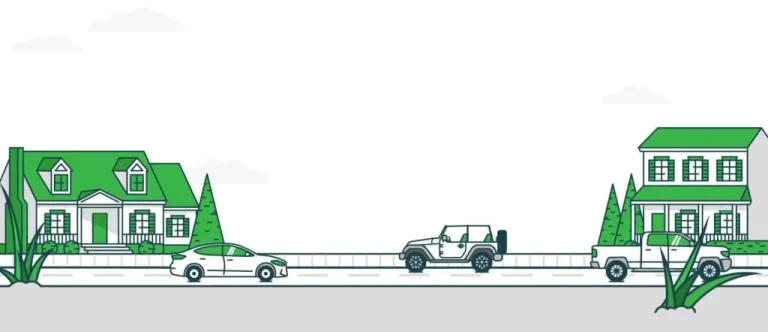Beyond logistical and administrative purposes, your address is very important to your auto insurance company. It has a tremendous influence on how much you pay in premiums. Read on to find out how exactly your address affects car insurance, and what you should do with your car insurance when you move.
How Does Changing Your Address Affect Car Insurance?
Your address is one of the many factors that insurance companies use to determine auto premiums. Changing your address can change your level of risk, so changing your address can raise or lower your rate depending on where you move.
When you’re getting a car insurance quote, insurers always ask for your address. Other than needing to know where to send bills and information, carriers want to know your address because it directly affects how much you’ll pay for coverage.
Insurance companies keep track of accident reports, claim filings, and other relevant statistics in different areas. Each insurance company blends these pieces of information differently to help produce optimal premiums for them, which is why you won’t usually see exactly the same rates across the board for all insurers in an area.
But, certain trends start to emerge, and you will find some areas that are generally more expensive than others. Here are some of the common reasons why car insurance rates can change depending on your address:
Population Density
People in big cities often pay more for car insurance than people in rural areas or suburbs. This is because the increased traffic creates a greater likelihood of an accident. More accidents mean more claims.
Also, more traffic means a greater chance of encountering uninsured drivers. Crashing into someone without insurance is an even greater hassle than a standard accident claim. To counteract these increased risks, insurance companies generally charge higher premiums to people in big cities.
Crime Rates
Cities often have higher crime rates, too, but changing addresses from any place with lower crime rates to higher crime rates can affect your car insurance. Providers are aware of areas that spawn more stolen vehicles and vandalism claims. If you move to an area with more crime, your auto insurance can go up as a result.
Also, insurance companies like to know how you store your car when you’re not driving. A car parked in a garage overnight has a much smaller chance of being burglarized than a car on the street. If your address change affects where you park your car, your premiums could change, too. Parking in a garage protects your vehicle from natural disasters, too.
State-Mandated Liability Insurance
You must have car insurance to own and operate a vehicle. The amount you’re required to have varies by state, though. So, if you move states, you may need to adjust the amount of liability insurance you have. This can affect your rate.
Some states may also require you to carry Personal Injury Protection, or PIP coverage, while other states won’t. Usually, the more insurance you need, the higher your rate can get. We’ll shed more light on why it’s important to update your car insurance when you move states a little later on.
Does Zip Code Affect Car Insurance?
Just like your address, your ZIP code affects car insurance, too, a little more broadly. Insurance companies can use your ZIP code to help categorize your risk as a driver. Insurers can track claims, accidents, and more by ZIP code.
When you’re getting a car insurance quote online, you often see options to compare rates by ZIP code. This is possible because many insurance companies use ZIP codes to organize and segment their policies. A ZIP code can give an accurate estimate of rates in that area because insurers know what their policyholders pay in that area. They’re aware, often due to crime reports and claims history, of what risks the area poses. This is one of the reasons why the cost of car insurance can vary from person to person in the same city.
However, some states are trying to curb the use of ZIP codes in car insurance pricing. ZIP codes that experience higher rates are often urban, highly-populated areas, especially in big cities. As we mentioned earlier, more people and more cars mean greater chances of accidents and crime, which increases potential insurance losses and expenses for a provider.
But, these ZIP codes are often impoverished areas, and some states are trying to ease the burden on people who live in these places. For example, California, Michigan, and Illinois have all taken efforts to restrict the use of ZIP codes in determining auto rates.
Do You Have to Change Car Insurance When You Move States?
Yes, you need to at least update your current car insurance when you move by notifying your carrier. If your current insurer doesn’t offer coverage in your new state, you’ll need to get a new policy as soon as possible. You usually need to get car insurance before you register your car in your new state. The amount of time you have to register your car varies, but generally, you have 30 days or less.
You should contact your car insurance company to let them know you’ve decided to move. They’ll want to know some more information, like your new address, and they’ll tell you how and why your rate may change. You may need to get more coverage, too. Every state has its own minimum liability requirements.
For example, let’s say you’re moving from Florida to Georgia. Florida requires drivers to carry at least $10,000 per person for bodily injury coverage, $10,000 of property damage coverage per accident, and $10,000 per person of uninsured motorist coverage. Georgia has higher minimum liability insurance requirements: 25/25/25, or $25,000 per person bodily injury coverage, $25,000 property damage coverage per accident, and $25,000 worth of uninsured or underinsured motorist coverage.
To maintain just minimum coverage, you’ll have to up how much insurance you’re carrying. Your new state may be a no-fault state as well. No-fault states have slightly different insurance rules, and you may need to carry PIP. Twelve states are no-fault states. These are:
- Florida
- Hawaii
- Kansas
- Kentucky
- Massachusetts
- Michigan
- Minnesota
- New Jersey
- New York
- North Dakota
- Pennsylvania
- Utah
Depending on the rules of your new state and your location within it, your rate will likely change. If you’re unhappy with the post-move premium your insurer suggests, moving is a great time to start shopping around for car insurance.
But, remember you may need proof of insurance to register your car. Try to sort out your insurance needs as soon as possible so you have the time you need to find the best rates and get settled without having to rush through finding the right coverage to legally drive in your new state.
If you’re a college student taking a family car when you head to school in a new state, you may not need to change anything about your insurance. You should still notify your carrier, but you’re probably still eligible for coverage under your parents’ plan since your permanent address is still the policyholders’ (your parents’) address.
What Happens If I Don’t Change My Address on My Car Insurance?
Not changing your address when you move, especially if you move states, can cause problems with your insurance company. In the worst-case scenario, you may be criminally liable.
Insurers can be understanding if you forget to change your address after you move within the same city or to the next town over from your old one. But, if you purposely mislead your provider to try to avoid an insurance rate hike, you could be in big trouble.
Your insurer will likely deny a claim if they find out, and you could be committing insurance fraud. Similarly, using a friend’s ZIP code or address in an old state is not OK after you move to a new state. Always be transparent and honest with your insurance company.
If you’re not happy with a rate change after you move, your best bet is to compare rates and policies from multiple carriers. Remember to look for new discounts you may be eligible for, too, like a new home discount or safe driving discount.
The editorial content on Clovered’s website is meant to be informational material and should not be considered legal advice.




